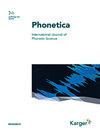J.M. Levis, Intelligibility, Oral Communication, and the Teaching of Pronunciation, Cambridge Applied Linguistics Series, Vol. 27, Cambridge, Cambridge University Press, 2018
IF 1.1
3区 文学
Q3 ACOUSTICS
引用次数: 0
Abstract
Globalization has had many notable effects on communication in the past decades. Two of them are: firstly, that English has become a major lingua franca for conducting business, gaining education, and engaging in social interaction, and secondly, that in these communication situations, “many, if not most, interactions in English around the world take place without the involvement of a native speaker” (p. 3). Furthermore, compared to other levels of language such as syntax and morphology, pronunciation is, according to most empirical evidence, the make-it-orbreak-it factor when it comes to informationally and socially successful conversations among non-native (L2) speakers of English as well as between L2 speakers and native (L1) speakers. In other words, globalization of economics and the media have given a new meaning to the research and teaching of phonological and phonetic issues. It is against this background that the monograph of John M. Levis was written. With a focus on English, its chapters are built around questions like: • How should the fact that most oral communication in the world today takes place between L2 speakers shape the research and training of phonological and phonetic issues? • How can we determine the relative importance of segmental and prosodic features for speech intelligibility and, thus, better decide which features should be given priority in L2 teaching? • To what extent should these decisions take into account contextual, situational, stylistic, and linguistic variables? The above questions already imply that Levis’ book is firmly anchored within the field of applied speech sciences. Yet, it is not a regular course book. It is a scientific monograph that provides an interdisciplinary state-of-the art overview of languageintrinsic and -extrinsic intelligibility effects, based on which the author develops a plea for reconsidering traditional empirical and theoretical approaches to secondlanguage teaching. Accordingly, the practical value of the book is limited insofar as it contains no specific instructions or exercises on how segmental and prosodic features Received: January 7, 2019 Accepted: February 20, 2019 Published online: May 16, 2019J.M.李维斯,可理解性,口头交流和发音教学,剑桥应用语言学系列,第27卷,剑桥,剑桥大学出版社,2018年
在过去的几十年里,全球化对传播产生了许多显著的影响。其中两个是:首先,英语已成为开展商业活动、接受教育和参与社会交往的主要通用语,其次,在这些交流场合中,“世界上许多(如果不是大多数)用英语进行的交流都是在没有母语人士参与的情况下进行的”(第3页)。此外,根据大多数经验证据,与语法和词法等其他语言水平相比,发音是,当涉及到非母语(L2)英语使用者之间以及L2使用者与母语(L1)使用者之间的信息和社交成功对话时,成功或失败的因素。换句话说,经济全球化和媒体全球化给音韵学和语音问题的研究和教学赋予了新的意义。约翰·m·李维斯的专著就是在这样的背景下写成的。本书以英语为重点,围绕以下问题展开:•当今世界上大多数口语交流都发生在第二语言使用者之间,这一事实如何影响语音和语音问题的研究和训练?•我们如何确定语段和韵律特征对语音可理解性的相对重要性,从而更好地决定在第二语言教学中应该优先考虑哪些特征?•这些决策应该在多大程度上考虑上下文、情景、风格和语言变量?上述问题已经暗示,李维斯的书是牢固地锚定在应用语言科学领域。然而,这不是一个常规课程的书。这是一本科学专著,它提供了语言内在和外在可理解性效应的跨学科的最新概述,在此基础上,作者提出了对第二语言教学中传统的经验和理论方法的重新思考。因此,这本书的实用价值是有限的,因为它没有包含关于如何分段和韵律特征的具体说明或练习。收稿日期:2019年1月7日
本文章由计算机程序翻译,如有差异,请以英文原文为准。
求助全文
约1分钟内获得全文
求助全文
来源期刊

Phonetica
物理-声学
CiteScore
1.90
自引率
0.00%
发文量
15
审稿时长
>12 weeks
期刊介绍:
Contemporary research into spoken language employs a wide range of approaches, from instrumental measures to perceptual and neurocognitive measures, to computational models, for investigating the properties and principles of speech in communicative settings across the world’s languages. ''Phonetica'' is an international interdisciplinary forum for phonetic science that covers all aspects of the subject matter, from phonetic and phonological descriptions of segments and prosodies to speech physiology, articulation, acoustics, perception, acquisition, and phonetic variation and change. ''Phonetica'' thus provides a platform for a comprehensive understanding of speaker-hearer interaction across languages and dialects, and of learning contexts throughout the lifespan. Papers published in this journal report expert original work that deals both with theoretical issues and with new empirical data, as well as with innovative methods and applications that will help to advance the field.
 求助内容:
求助内容: 应助结果提醒方式:
应助结果提醒方式:


